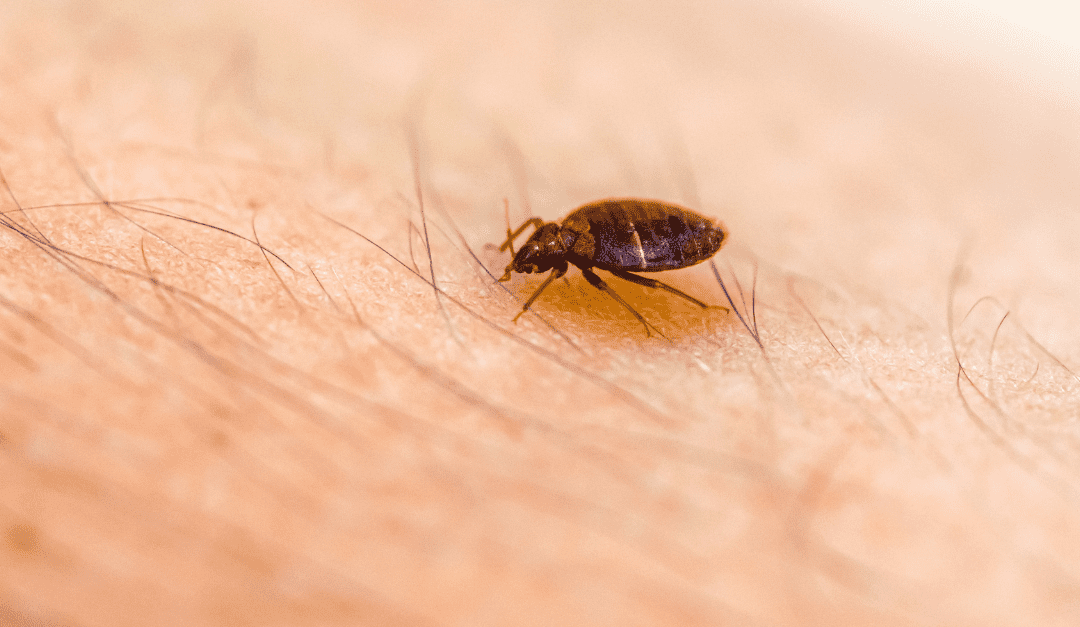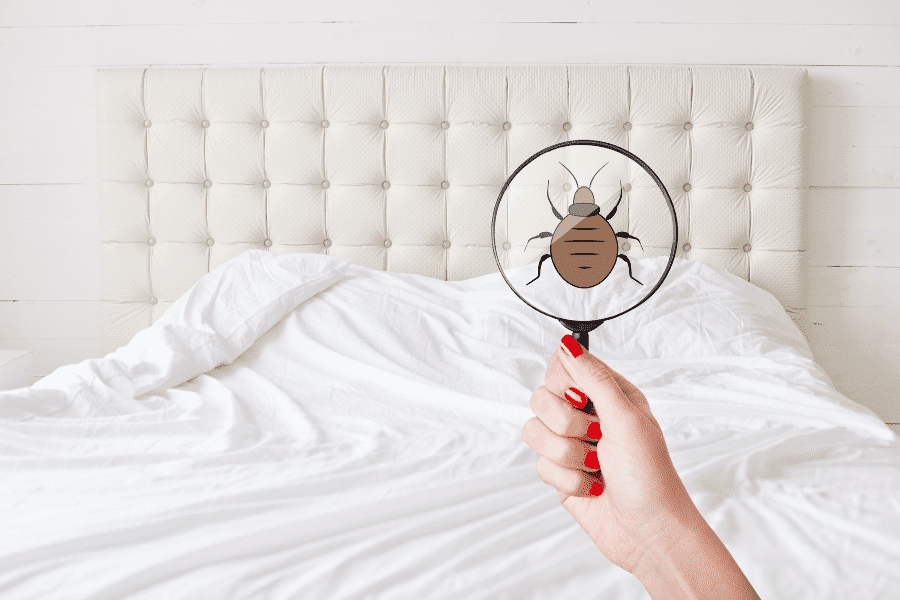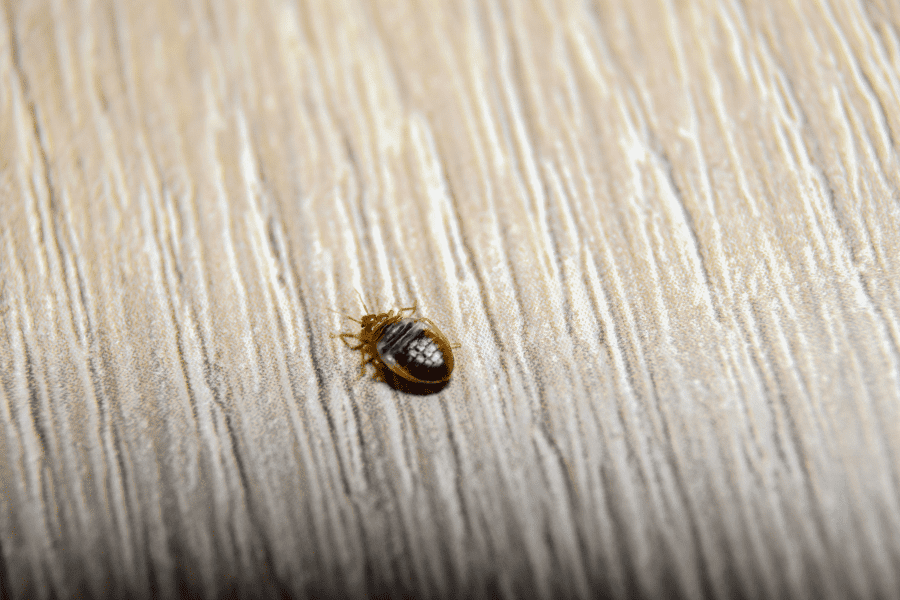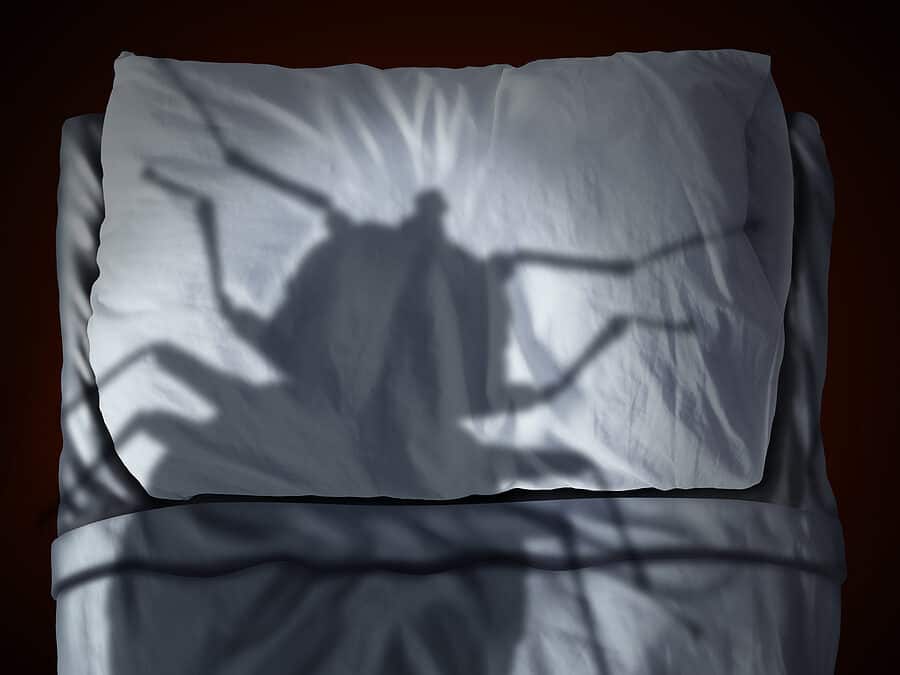READY TO GET STARTED?
REQUEST A FREE ESTIMATE
Fill out the form below or call (888) 466-7849 for a free, no-obligation estimate.

Bed bugs are tiny insects that are notorious for infesting bedding, mattresses, and furniture. They are often found in hotels and other accommodation facilities, making travel a common way to pick them up. Bed bug infestations are not only annoying but can also lead to health problems. Therefore, it’s important to take steps to prevent bed bugs while traveling. Let’s discuss some tips on how to prevent bed bugs while traveling.
Before booking your accommodation, it’s important to research it thoroughly. Check online reviews and ratings to see if any guests have reported bed bug problems. If you find several negative reviews, it’s best to look for alternative accommodation.
Once you arrive at your accommodation, inspect your room for bed bugs. Start by checking the mattress, bed frame, headboard, and box spring. Look for black spots or bloodstains, which are signs of bed bug activity. You may also spot actual bugs or their shed skins. Additionally, check the furniture, curtains, and carpet for any signs of bed bugs.
These pests can easily climb onto your luggage if it’s placed on the floor, so it’s best to keep it off the ground. Use a luggage rack or place your luggage on a hard surface such as a table. Avoid placing your luggage on upholstered furniture or the bed.
Using protective covers for your mattress and box spring can help prevent these household pests from infesting them. These covers create a barrier that prevents them from entering or escaping from the mattress and box spring.
If you suspect that your clothes may have come into contact with bed bugs, wash them in hot water as soon as possible. These pests cannot survive in temperatures above 120°F, so washing your clothes in hot water and drying them on high heat can kill any bed bugs that may be present.
When using shared spaces such as the hotel gym or laundromat, be cautious. Bed bugs can easily hitch a ride on your clothes or bag, so it’s best to keep your belongings in a sealed bag and avoid placing them on the floor. After using shared spaces, inspect your belongings carefully and wash them in hot water.
Bed bugs are a common problem when traveling, but by taking the necessary precautions, you can prevent them from infesting your luggage and coming home with you. If you suspect you have a bed bug infestation, reach out to your local pest control company to create the best plan of action.

Bed bugs are one of the few pests that you hope you never find in your home. These fearsome insects bring itchy bites, crawling hordes, and ruined furniture. Bed bugs are one of the most difficult pests to get rid of. Identifying them and acting quickly is the first step in your plan of action. Here’s what to do if you find yourself in a bed bug situation.
After proper identification, determining where the bed bugs came from is the next step. If you live in an apartment building, be sure to notify your landlord immediately, as they might hold the responsibility of providing bed bug control treatments. If you live in a single-family home, then begin by inspecting all areas of your home to understand the full extent of the bed bug infestation.
Once you discover the extent of the infestation, now is the time to keep it from spreading. Here are some helpful bed bug prevention tips:
Tackling bed bugs is a difficult task, especially alone. If you’ve done the above, but are still experiencing an infestation, then reach out to your local pest control company. They will have licensed professionals who can determine the best plan of action to rid your home of bed bugs.

Once infested, it can be extremely difficult to get rid of bed bugs. These “hitchhiking” bugs find refuge in our beds, furniture, and clothes, often feeding on humans or pets for a blood meal to survive. The first step in avoiding these insects is understanding how they can enter our Murfreesboro homes, so you can place appropriate precautions. Check out how these bed bugs get inside our homes and what you can do to prevent them below.
Bed bugs are often called the “hitchhiking” pest, referring to their ability to latch onto items and travel long distances. These pests can be found where humans tend to congregate and spend extended time, including public transportation, libraries, and hotel rooms. This often can make travel season the perfect time for these bed bugs to latch onto your travel items and follow you home. Additionally, bed bugs are known to latch onto items transferred from one house to another, such as secondhand furniture, mattresses, box springs, and couches.
If you’re traveling, be cautious of the hotel room you’re staying in. Once you arrive at the hotel room, inspect places where bed bugs can hide, looking for live insects, blood stains, and eggs throughout your room. If a larger bed bug infestation is present, you’ll smell a sweet, musty odor.
Likewise, once you’ve returned home from your trip, unpack your luggage outside instead of bringing it inside. Since bed bugs cannot withstand high temperatures, take all your clothes and wash them immediately, running them through a high-heat dryer cycle to help eliminate them. Consider storing your luggage in outside places such as garages or storage closets. Before you purchase secondhand furniture, inspect all used couches, mattresses, or box springs for bed bugs and other pests.
If you’ve spotted signs of bed bugs or seen live bugs in your home, you need to act fast to get rid of them. While there are several do-it-yourself methods to eliminate bed bugs, it’s best to call a professional for help. Your nearest pest control company is trained in the latest treatment methods to eliminate and prevent bed bugs. These professionals will give your home an in-depth inspection and then implement the best treatment and bed bug control plan customized to your home.

Bed bugs are small, apple seed-sized insects. They are flat and oval with horizontal ridges across their bodies. They don’t have wings but can move extremely fast. They can leave mosquito-like bites all over your body and can be an itchy problem.
Coming home from a vacation or even a day out shouldn’t result in a bed bug infestation. If you discover you brought home these common pests, it’s crunch time to keep them from spreading to other areas of your home.
The first thing you should do is identify the pest and verify it is a bed bug. If you believe it is a bed bug, then giving your local bed bug control company a call is the best option. Here are some other things you can do in the meantime:
Give your local pest control company a call today. Their highly trained pest professionals will be able to rid your home of bed bugs and give you back your peace of mind.

Many of us have heard the old saying, “Don’t let the bed bugs bite,” often instilling some fear before going to bed! Unfortunately, this saying can hold some truths as these insects can bring itchy bites, crawling hordes, and ruined furniture! They can be difficult to remove and eliminate, making it essential for Macon homeowners to understand how to identify them and what steps to take if they spot one in their home. Check out everything you need to know about these household pests below.
Bed bugs are tiny, appleseed-sized insects with flat, oval-shaped bodies and horizontal ridges across their bodies. Since these pests are so small, they can fit in the smallest crack, crevice, or any small hiding spot. The best way to spot bed bug signs is to look for physical signs, such as rusty stains on the bed sheets or mattresses, dark spots on fabric, eggs or eggshells, and live bed bugs. You will often find these pests or signs of bed bugs around the bed, near piping, seams, tags of mattresses, box springs, and in cracks on the bed frame and headboard.
Bed bugs are notorious for hitchhiking, allowing them to travel long distances at a time. They will often latch onto suitcases, linens, clothes, old furniture, groceries, and more. The best way to prevent these pests from entering your home in the first place is to inspect items before entering the home. After traveling, avoid bringing in your suitcase; instead, remove your clothes and wash them immediately through a high-heat dryer cycle. Likewise, before you bring in any second-hand furniture, groceries, or deliveries, make sure to inspect them for bugs.
If you’ve noticed bed bug signs or identified live bugs, you will want to act fast to eliminate them. Since bed bugs are elusive, surviving under extreme conditions, they often cannot be eliminated through do-it-yourself methods. Once you have identified a bed bug infestation, the best plan of action is to call a pest control company for help. These professionals will provide you with a proper inspection to identify the areas where they have invaded. After an inspection is completed, your pest professional will provide you with a bed bug control plan, including either a chemical or heat treatment, all depending on your pest situation.
If you suspect a bed bug infestation in your home, contact your local pest control company to assess the situation. A trained professional will help you decide the best plan of action, treatment, and prevention for your home.